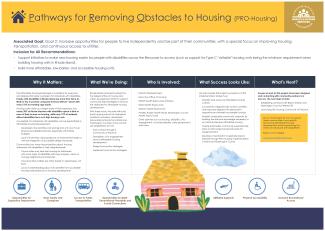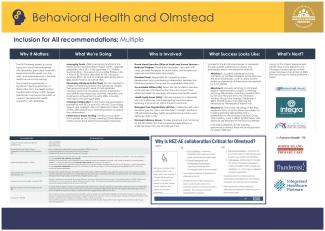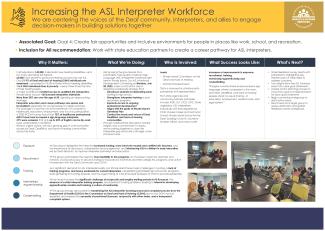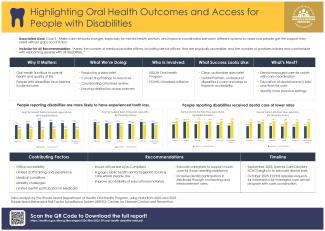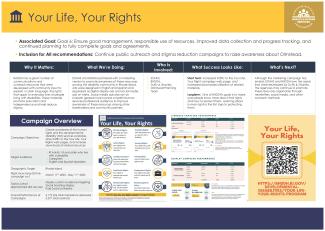RI Olmstead Planning
What is Olmstead?
Olmstead is a U.S. Supreme Court ruling. It found that segregation of people with disabilities is discrimination under the Americans with Disabilities Act (ADA).
Under the Olmstead ruling, states have a legal obligation to have the supports in place for individuals with disabilities to live, work, and receive services in the community in the least restrictive setting permitted by their disabilities. Specifically, the United States Supreme Court requires states to have supports in place for people with disabilities in community settings, rather than in institutions, whenever treatment professionals determine that such placement is appropriate, the affected persons do not oppose such placement, and the state can reasonably accommodate the placement, taking into account the resources available to the state and the needs of others with disabilities.
The first step of complying with Olmstead is developing a plan that works “for moving people out of restrictive settings into the community.” In Rhode Island, we strive to design a plan that also prevents unnecessary institutionalization in the first place.
Once the plan is designed, the next step is to implement it, track Rhode Island’s progress, and adjust where necessary.
Press release: Governor McKee Signs Executive Order to Better Support Rhode Islanders with Disabilities | English | Spanish |
Second Annual Olmstead Forum
The second annual Olmstead Forum was held on September 29, 2025. Materials are available below.
- Agenda
- Facilitator's slide deck
- Implementation gallery (You can scroll throw the virtual gallery below or click here to view or download the PDF version.)
Olmstead Plan Documents
The Executive Office of Health and Human Services draft Olmstead Plan is available below.
- PDF Version: Click here to view and download the latest version of "Integration for All: Rhode Island Olmstead Plan 2025-2030."
- Word Document Version: Click here to view and download the latest version of "Integration for All: Rhode Island Olmstead Plan 2025-2030."
- The period to submit feedback on draft one of Rhode Island's Olmstead Plan is now closed. Please stay tuned for opportunities to provide input on future drafts and planning activities.
EOHHS' Olmstead Planning and Implementation 90-Day Report is available below.
Take our survey
Take our Olmstead Planning Survey in English, Spanish, or Portuguese to provide your feedback today.
Olmstead applies to anyone who the ADA considers to have a disability.
An individual with a disability is defined by the ADA as a person who has a physical or mental impairment that substantially limits one or more major life activities, a person who has a history or record of such an impairment, or a person who is perceived by others as having such an impairment.
In Rhode Island an estimated 22% of children have at least one special health care need and 25% of adults have a disability.
Rhode Islanders with disabilities are diverse but, unfortunately some individuals with disabilities have worse social, economic, healthcare access and health outcomes than their peers.
Rhode Islanders with a disability have a harder time affording to live in the community than Rhode Islanders without a disability. For instance, the poverty rate for people aged 18 to 64 with disabilities is (24.2%) as opposed to people without (8.3%)1.
In 2021-2022 in Rhode Island, of the 65 kindergartners who were suspended at least one day, 35% had a developmental delay or disability.2
“During the 2022-2023 school year, Rhode Island students receiving special education services represented 17% of the student population but represented 33% of suspensions.” 3
30.4% of people with disabilities are housing cost burdened , meaning they spend 30% of more of their household income on housing costs, compared to 16.4% of people without disabilities in Rhode Island.1
References
- Disability Compendium 2024, pages 134, 316, 167: ADSC Compendium 2024 - Part of the 2024 Annual Disability Statistics Collection
- Kids Count 2023 Factbook, page 137:
- Kids Count 2024 Factbook, page 158
Intuitional level care is necessary for some individuals, but for most individuals with disabilities, it is not.
Rhode Island is working to reduce unnecessary institutionalization by:
- Building community based mental health services through Certified Community Behavioral Health Centers (CCBHCs).
- Reducing long stays at acute care hospitals or Skilled Nursing Facilities by investing in Medical Respite; temporary, supportive housing and healthcare for homeless individuals recovering from mental or physical illness, injury, or medical treatment, offering a bridge from emergency care to stability
- Investing in Children’s Mobile Response and Stabilization Services (mobile crisis) to help children and youth experiencing behavioral health crises to get care in the community instead of in hospitals;
- Strengthening community-level infrastructure to increase affordable housing options, design accessible streets, and enhance real-time social service feedback loops through our Health Equity Zones;
- Enabling children to be cared for at home instead of an institution through the Katie Beckett Program;
- and more!
While we have made strides, adopting an Olmstead Plan will allow us to make additional progress in ensuring people with disabilities can live in their communities.
- Prevent Unnecessary Institutionalizations by identifying what drives institutionalization before it happens and working to correct it including, but not limited to, the investment in home and community-based services.
- Improve Institutional Level Care by understanding what’s working well and what needs to change to assure individuals can quickly and effectively stabilize and transition out of restrictive settings.
- Support Sustainable Deinstitutionalization by enhancing community capacity to support individuals leaving institutions and ensure that they do not cycle back into them.
Meet the State Project Team

Allegra Scharff is the Chief of Healthcare Equity at the Rhode Island Department of Health and the state's Olmstead Coordinator. Since 2011, she has focused on advancing health equity in Rhode Island, specializing in eliminating health disparities with a focus on the impact of incarceration on individual and community health. As a mother of a child with a disability, she is passionate about creating inclusive environments and ensuring that those with lived experience guide their work. She looks forward to connecting with more Rhode Islanders through this planning process.
Interested in learning more about the state planning process? Contact Allegra by email.
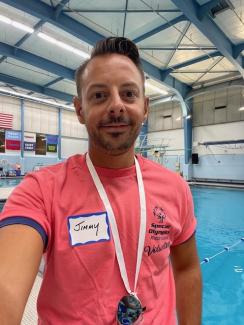
James Rajotte is the Director of Strategy and Innovation. He is excited to get to know everyone through this newsletter and to be part of the EOHHS team working on Olmstead planning. At EOHHS, he ensures their plans align with the Rhode Island 2030 Plan and health and human services priorities. His work includes collaboration with the Department of Housing and other government agencies, as well as fostering engagement in various EOHHS programs, such as Pay for Success, Medicaid Renewals, Olmstead Planning, and Medical Respite and Mobile Wound Care.
Olmstead Advisory Group
Per Executive Order 24-11 signed on August 14th, 2024:
The Executive Office of Health and Human Services (EOHHS) will gather feedback on Olmstead Plan priorities, assets, and needs by forming an advisory group (Olmstead Advisory Group) comprised of community members with lived experience. Members of the Olmstead Advisory Group may also include, but need not be limited to, representatives of the following:
- Commission for Health Advocacy and Equity;
- Consumer Advisory Council;
- Commission for the Deaf and Hard of Hearing;
- Governor’s Commission on Aging;
- EOHHS Independent Advisory Council;
- Governor’s Overdose Prevention and Intervention Task Force;
- Governor’s Council on Behavioral Health;
- Long-Term Care Coordinating Council;
- Rhode Island Continuum of Care;
- Rhode Island Developmental Disabilities Council;
- Rhode Island Reentry Alliance;
- Youth Advisory Council and
- Mental Health Association of Rhode Island.
Members of the Olmstead Advisory Group will be appointed by the Secretary of EOHHS and shall serve at the Secretary’s pleasure. All meetings shall be held in conformance with the Open Meetings Act, R.I. Gen. Laws § 42-46-1, et seq.
Planning Consultants and Supports
The State team and advisory group will be supported by planning consultants and technical assistance (TA) providers. Consultants and TA providers will support the facilitation of plan development meetings, assist with additional information gathering through policy and budget reviews, analyze primary and secondary data, identify, and share existing best practices throughout plan development, and help validate and prioritize planning focus areas through assessment of community feedback and collected data.
Timeline
The Planning Process is underway! As of August 2024, the plan development workgroups are forming. If you are interested in joining a work group or finding other ways to be involved in the Olmstead planning process, learn more under the Get Involved tab.
A draft of the plan will be presented to the Office of the Governor by February 15, 2025.
- Attend the Olmstead Advisory Group meetings and provide public comment.
- Click here to apply to be a member of the Olmstead Advisory Group.
- Sign up for our newsletter to stay up to date on the planning process and learn about upcoming community feedback sessions.
- Take our Survey in English, Spanish, or Portuguese to provide your feedback today.
- Contact: Allegra.scharff@health.ri.gov.
Newsletter Archive:
- August 2024 Newsletter: August Link
- Olmstead Community Forum Email (Sent Sept. 13, 2024): Community Forum Link
- September 2024 Newsletter: September Link
- October 2024 Newsletter: October Link
- November 2024 Newsletter: November Link
- December 2024 Newsletter: December Link

